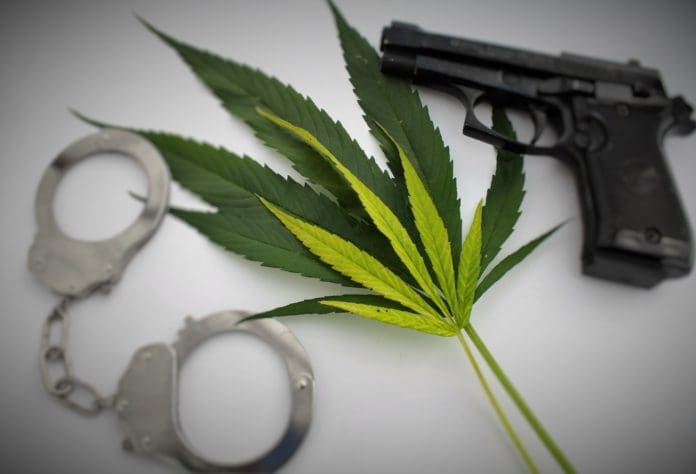Dude, Appeals Court Rules Pot Use and Guns DO Mix…Kind Of

A federal appeals court on Wednesday upheld a district court ruling that the prohibition on firearm possession by marijuana users is unconstitutional.
A three-judge panel of the 5th Circuit Court of Appeals in the case U.S. v. Connelly said the Texas woman involved in the action was a “non-violent, marijuana-smoking gun owner” whose Second Amendment right to keep and bear arms should not have been infringed.
“The short of it is that our history and tradition may support some limits on a presently intoxicated person’s right to carry a weapon, but they do not support disarming a sober person based solely on past substance usage,” the ruling, written by Circuit Judge Kurt Engelhardt, stated.
The case revolves around a Texas woman, Paola Connelly, who was indicted after El Paso police officers responded in December 2021 to a report of shots fired at her home after a conflict arose between her husband and their neighbor. Upon questioning, Connelly admitted that she sometimes smoked marijuana, and a subsequent search of the home found several firearms.
The U.S. Department of Justice (DOJ) argued that the federal law against gun and ammunition possession by someone who uses marijuana is consistent with other historical restrictions on gun ownership, such as by “mental defectives … and others whose possession of firearms is contrary to the public interests.”
However, the 5Th Circuit judges, leaning mostly on the 2022 Supreme Court decision in New York State Rifle & Pistol Ass’n v. Bruen, didn’t buy that reasoning.
“Laws designed to disarm the severely mentally ill do not justify depriving those of sound mind of their Second Amendment rights,” the ruling stated. “The analogy stands only if someone is so intoxicated as to be in a state comparable to ‘lunacy.’ Just as there is no historical justification for disarming citizens of sound mind, there is no historical justification for disarming a sober citizen not presently under an impairing influence….”
The ruling then embellished on that thought, stating: “So the Bruen-style analogical question is this: Which is Paola more like: someone whose mental illness is so severe that she presents a danger to herself and others (i.e., someone who would be confined and deprived of firearms under this tradition and history of Second Amendment regulation)? Or a repeat alcohol user (who would not)? Paola falls into the latter camp. While intoxicated, she may be comparable to a severely mentally ill person whom the Founders would disarm. But, while sober, she is like a repeat alcohol user between periods of intoxication, whom the Founders would not disarm….”
The ruling also criticized the DOJ’s argument that the government’s power allowed it to decide who was “dangerous” enough to have rights taken away.
“The government also contends that persons whom Congress deems ‘dangerous’ can have their Second Amendment rights stripped,” the ruling stated. “In doing so, it posits that Paola—a non-violent marijuana user—falls into the category of ‘dangerous.’ But our history and tradition of disarming ‘dangerous’ persons does not include non-violent marijuana users like Paola. Indeed, not one piece of historical evidence suggests that, at the time they ratified the Second Amendment, the Founders authorized Congress to disarm anyone it deemed dangerous.”
The ruling concluded: “Perhaps the government could succeed if it were able to demonstrate that the drugs Paola used were so powerful that they rendered her permanently impaired in a way comparable to severe mental illness. It also might succeed if it were able to demonstrate that Paola’s drug use was so regular and heavy that it rendered her continually impaired. But it shows evidence of neither here.”
Read the full article here





